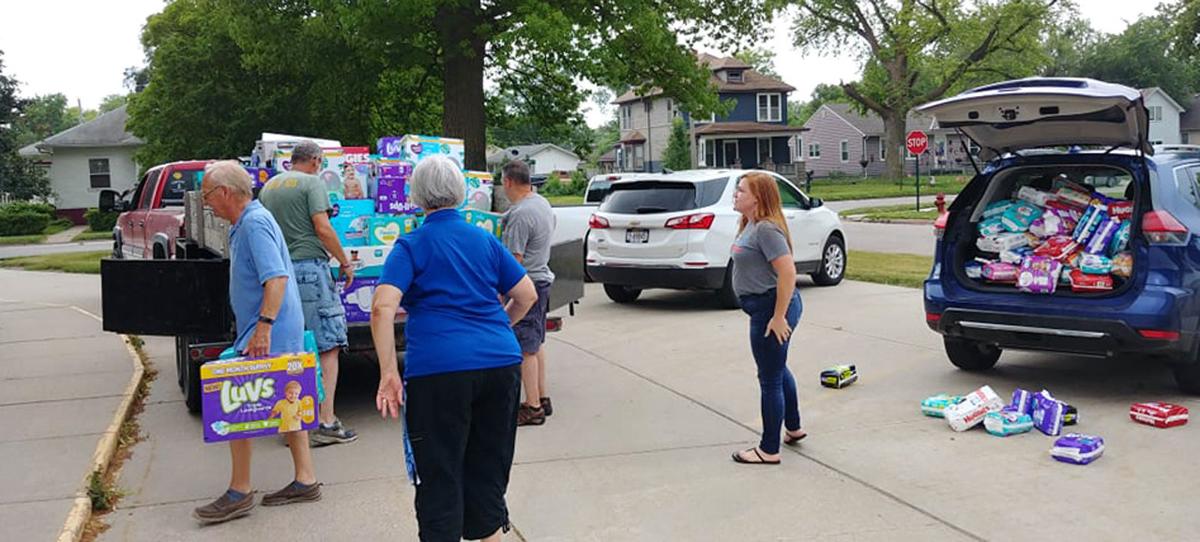
As the COVID-19 pandemic enters its second year and the economic fallout continues to cause widespread financial desperation, many local mutual aid groups say one of the things they need most of all are diaper donations.
Last week, South Brooklyn Mutual Aid delivered nearly 2,500 diapers to about 88 families. Parents, mostly mothers or grandmothers, were able to get at least a pack of 20 or 40 diapers each.
“It's not enough. For the younger babies that pee a lot, we give a little more,” said Sophia Sutcliffe, an organizer.
The group is spending about $400 a week and trying to stretch each dollar by organizing car trips to big-box stores for discounted bulk prices. But infants and toddlers use a lot of diapers a day. A newborn typically needs up to a dozen diaper changes daily, which can add up to over $80 a month for disposable diapers.
Despite the high cost of diapers, there are zero federal programs that go directly towards subsidizing the expense for struggling families. Cash relief through the Temporary Assistance for Needy Families (TANF) program can be used to purchase diapers, but the allowance is also going towards rent, utility bills, and other hygiene essentials. In 2019, only 23% of families living in poverty received TANF cash monthly.
The Washington Post reports that diaper banks, which provide free diapers to low-income families and are established across the country, are struggling to meet demand. The National Diaper Bank Network has reported an average of 50% more diapers being distributed monthly to families in need than before the pandemic.
“The thing that is really, really scary is that so many places have just stopped giving out diapers or are so limited,” said Amy Wilson, an artist and organizer with Jersey City Mutual Aid Society.
Groups like Wilson’s and Sutcliffe’s are trying to prioritize their organizing efforts around diaper drives or earmarking donations. JCMAS is asking parents for any unused diapers or boxes of diapers purchased through their Amazon registry account (diaper cream is also on that list). If someone donates via Venmo to South Brooklyn Mutual Aid with a baby emoji, for instance, that money will go towards their $5,000 Diaper Fund goal.
But nurses and social workers have been calling for sustainable policy solutions to diaper accessibility. They see it as not only a public health issue for children—wearing a soiled diaper for too long can lead to urinary tract infections and diaper rash—but, to Sallie Porter, a pediatric nurse practitioner and associate professor at Rutgers University, “it's an issue for moms in terms of their feeling like a good mom.”
She adds, “That really is impactful even more so than not being able to provide food that their baby needs.”
Listen to reporter Emily Lang's radio story for WNYC:
A Yale University study found that lack of access to diapers is linked to depression and stress among mothers. That stress has been exacerbated during the pandemic as well, with mothers being three times more likely than fathers to have lost work this past year.
New Jersey and New York are two of nine states where diapers are tax-exempt, though advocates say that’s insufficient. Last month, Governor Andrew Cuomo announced a non-profit partnership program to distribute 20 million diapers throughout the state’s food bank network.
But Porter also wants to see legislation such as the federal End Diaper Need Act of 2021 to be passed as a first step. Some federal lawmakers in New York and New Jersey are co-sponsors of the bill, which would provide $200 million from 2022-2025 to social services specifically for diapers. Medicaid would receive funding to ensure that 200 medically-necessary diapers can be available for at-need children. The legislation would also make diapers a “qualified medical expense” so families can purchase the products through health savings accounts.
For Porter, progress can’t come fast enough. She believes the government has been unwilling to prioritize struggling moms, particularly those who are Black or Latino.
“A lot of people believe that if you have kids that you need to be the one that is completely taking care of them without recognizing that situations change and that this has an actual public health impact,” said Porter. “It’s the woman’s penalty.”
The Link LonkMarch 07, 2021 at 10:39PM
https://ift.tt/3t0Ppqi
"It's Not Enough": Demand For Diaper Donations Soars As Pandemic Enters Year Two - Gothamist
https://ift.tt/2Comt7j
Diapers

No comments:
Post a Comment